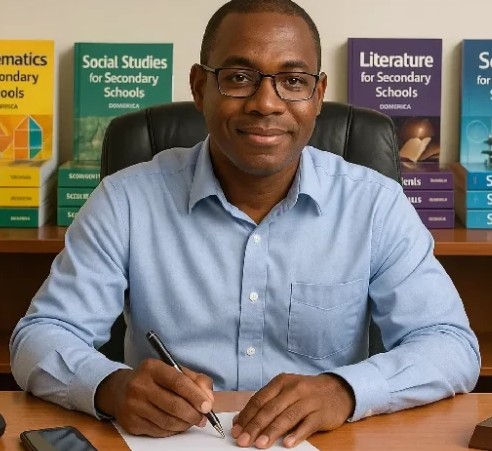🚨 BREAKING: Parents Share Disturbing Story of Government Neglect 🚨
We have been contacted by a set of concerned parents who have experienced a shocking series of events involving government authorities. After thoroughly verifying the facts, including email and text correspondence, we feel it is crucial to bring their story to light.
This story exposes the failures and negligence of a system meant to protect its citizens, particularly the most vulnerable children.
In July 2025, a Dominican-born mother returned to Dominica with her husband and their son, a Dominican citizen aged sixteen (16), after residing abroad for approximately twenty (20) years. Upon their return, the parents began making inquiries about enrolling their son in school, as he was of mandatory school age under Dominican law.
Their first point of contact was the Office of the Chief Education Officer, Jeffrey Blaize. During their initial meeting, Mr. Blaize appeared more focused on questioning the family’s reasons for relocating to Dominica and their preference for enrolling their son in a public rather than a private institution. After an extended discussion, Mr. Blaize stated that he was uncertain as to how to proceed, as the student’s grade placement differed between the two education systems. He noted that had the child remained in Canada, he would be entering Grade 11 (Form 4), whereas in Dominica, he would be expected to enter Grade 12 (Form 5).
Mr. Blaize’s preliminary recommendation was that the student be referred to the Dominica State College to complete a one-year preparatory program prior to commencing a regular college curriculum.
On July 4, 2025, the family attended the Dominica State College and met with the Dean of Academics. After reviewing the situation, the Dean stated that the College would need to review the student’s two years of academic report cards from Canada before making any determination. However, during this meeting, the conversation repeatedly shifted toward the mother’s decision to return to Dominica, rather than focusing on the student’s educational placement. The family found themselves redirecting the discussion back to their son’s enrollment multiple times.
The College advised the parents that they would receive a response within one week.
Two weeks later, on July 16, 2025, the parents followed up by text message. The College responded that they had not yet reviewed the 2 years of academic report cards and requested additional time.
Subsequent follow-up messages were sent on July 19, 20, and 21, 2025, but received no substantive response. On July 21, 2025 the College stated only that their role was to “make a recommendation,” without clarifying the nature or purpose of that recommendation. Again, the parents were told to wait.
By August 1, 2025, nearly a month after their initial contact, the College informed the family that they were now “working with a Canadian college” and a “school counselor who has lived in the Caribbean for some time.” No explanation was provided as to how this development related to their son’s enrollment, nor was there any clear outcome or timeline given.
Shortly thereafter, communication from the College ceased altogether. It appeared that, rather than providing an answer, the College chose to defer responsibility back to the Office of the Chief Education Officer.
When the parents contacted Mr. Blaize’s office for follow-up, they were informed that he was on vacation until August 18, 2025, and were advised to consider enrolling their son in a private school “to avoid any problems.” Despite multiple attempts to seek assistance from other government departments, the parents were unable to obtain any progress or clarification during this period.
Upon Mr. Blaize’s return on August 18, 2025, the parents again reached out. After three days without response, Mr. Blaize eventually instructed them to complete an application for enrollment and to submit supporting documentation, including the Dominican passports of both mother and child, the father’s passport, and the child’s academic records. The family promptly complied with these instructions.
No clear timeline for review or decision was provided.
September 1, 2025, Subsequently, the parents received an email from the Chief Education Office stating “Please note that letter as referred is ready for pickup at the office of the Chief Education Officer” that there was a letter available for them to collect in person. When they requested that the letter instead please be emailed for convenience, all further communication from the office ceased. Despite multiple follow-up emails requesting clarification, the family has not received any confirmation as to whether their son is permitted to enroll in a public school.
As of the date of this statement, it appears that their son, a Dominican citizen of compulsory school age, has been effectively denied entry into the public education system without explanation or written justification. The family has requested, but not received, any documentation outlining the reasons for the delay, denial, or procedural requirements under the Education Act or Ministry policy.
The events described above reveal a disturbing pattern of negligence and deliberate obstruction on the part of the Dominican education system, with Jeffrey Blaize and the Dominica State College at the center of the failure. Despite the child being a Dominican citizen of compulsory school age, he has been effectively denied access to public education, a fundamental right guaranteed under Dominican law.

It is clear that the government, through the actions, or inactions of its officials, does not prioritize the education of children when political or personal biases are involved. Rather than addressing the family’s legitimate concern about their child’s enrollment, Mr. Blaize and the College repeatedly focused on the mothers decision to return to Dominica after decades abroad, treating their status as “diaspora” citizens as an inconvenience or insult. The family was subjected to unnecessary scrutiny, redirected conversations, and arbitrary delays, all while their child’s education was left in limbo.
The impact on the child has been profound. At sixteen years old, he is isolated, unable to attend school, and denied opportunities for social interaction or development. He has no classmates, cannot form friendships, and is forced to rely solely on home schooling. This has significant emotional and mental consequences, including feelings of rejection, alienation, and anxiety about his future. The denial of formal education at this age also limits his prospects, effectively forcing him to consider returning abroad to Canada to continue his studies, a country that granted him a passport but which Dominica itself has failed to serve as a home.
There is no precedent for a child of mandatory school age in Dominica being denied access to education. The facts suggest that this situation is politically motivated, rooted in resentment toward diaspora families who leave the country and later return. Rather than embracing citizens who have chosen to return home, the system punishes them, turning education into a tool of political bias. The message sent is chilling: if you were born abroad or lived abroad, you are not entitled to the same rights as children born and raised entirely within Dominica.
The conduct of Mr. Blaize and the College demonstrates deliberate obstruction. They ignored deadlines, deflected responsibility, failed to provide written justification for decisions, and ceased communication when the family demanded clarity. These are not administrative oversights, they are intentional acts that deny a child his right to education.
It is unacceptable that a Dominican child, granted citizenship at birth is treated as an outsider, forced to sit at home while his peers attend school, and left in a state of uncertainty regarding his future. This is not a matter of bureaucratic delay; it is a deliberate, politically-inflected denial of rights.
The Skerrit and his government must be held accountable. Education is not a privilege for those deemed “acceptable” by political or social biases, it is a fundamental right for every child, regardless of diaspora status or family history. The systemic resentment toward returning diaspora families must end, and the denial of education to this child must be rectified immediately, along with transparent accountability for the officials responsible.
This case underscores a larger issue: the politicization of education and the systemic prejudice against diaspora citizens. Families who left Dominica to seek opportunity abroad have done nothing wrong. They returned to contribute to their country, to raise families, and to honor their citizenship. Yet the government, through Mr. Blaize and associated institutions, treats them as offenders, denying their children access to the most basic and essential service: education.
The time for excuses is over. The child’s education must be restored, the political bias must be confronted, and the government must demonstrate that all Dominican citizens—regardless of diaspora status—are entitled to their rights and protections under the law.
Team DRP
